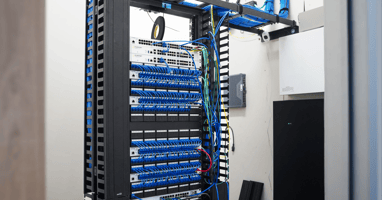Imagine your house has a tall fence around it with a secure, locked gate. This fence keeps people...
Tech Talk: What is a VPN?
What is a VPN? Understanding Virtual Private Networks
In simple terms, a VPN acts as a secure, private tunnel for your internet connection. Think of it like sending a package: instead of mailing it straight to your recipient, you send it to a trusted contact in another city first. That contact forwards it on—keeping your original location and the package’s contents hidden. The post office can only see that you sent something, not what’s inside or where it eventually ends up.
A VPN works the same way. It shields your online activity, masks your location, and encrypts your data—keeping your information secure and your browsing private. Many managed IT providers recommend pairing a VPN with secure email and other cybersecurity tools to help businesses protect sensitive data and maintain compliance.
While many people associate VPNs with streaming services—accessing content or platforms from other regions—the real power of VPNs lies in business use. Companies use them to safeguard remote connections, link multiple office locations, and ensure that employees can access company networks securely from anywhere. With the right managed service provider (MSP), businesses can maintain the privacy, security, and reliability their operations demand.
Reasons to Use a VPN
- Data protection while using public Wi-Fi – You may be sending an important email to a client while sitting in your favorite coffee shop, but there’s no greater vulnerability than accessing an Internet connection in a public setting. Now you’re at risk of cybercriminals intercepting unencrypted data on your computer. A VPN encrypts your connection, making it impossible for hackers to steal your information.
- ISPs can’t track you – Internet service providers love to track and collect personal data about your browsing history and then sell that information to advertisers. A VPN will block ISP access and protect your browsing information.
- Bypass censorship – VPNs allow you to access and connect to servers all over the world, helping you obtain content that is either restricted or not available in your country. Whether it’s a news website, social media platform, or streaming service in another part of the world – you have browsing freedom with a VPN.
When choosing a VPN service, make sure you’re looking for ones that provide strong encryption, fast speeds, and offer wide server locations for global access. This essential tool is perfect for protecting your privacy online so that you can browse safely and securely.
DOCUmation is a family-owned technology solutions company that provides IT, print, and software-managed services throughout Texas. To secure our team as your next managed service provider, contact us for more information.
.png?width=50&name=Sept%20Social%20(LinkedIn%20Post).png)



%20(2).png?width=50&name=SA%20Logo%20Squares%20(20%20x%2020%20in)%20(2).png)
